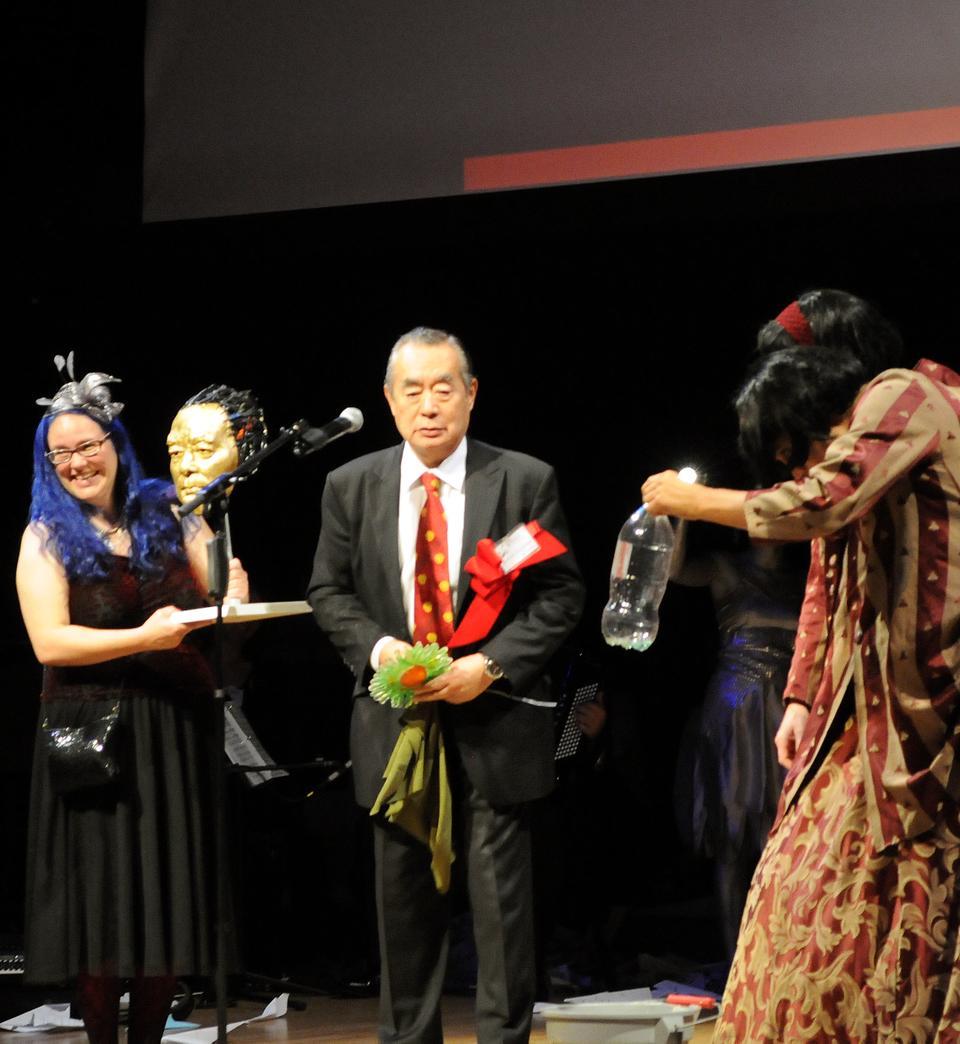
News
Harvard Researchers Develop AI-Driven Framework To Study Social Interactions, A Step Forward for Autism Research

News
Harvard Innovation Labs Announces 25 President’s Innovation Challenge Finalists

News
Graduate Student Council To Vote on Meeting Attendance Policy

News
Pop Hits and Politics: At Yardfest, Students Dance to Bedingfield and a Student Band Condemns Trump

News
Billionaire Investor Gerald Chan Under Scrutiny for Neglect of Historic Harvard Square Theater
Amid Laughter, Ig Nobel Awards Prizes

Naked men and women, wearing only silver paint and their undergarments, stormed the stage in a sold-out Sanders Theater last night, as audience members exploded in laughter and the winners of the twentieth annual Ig Nobel Awards presented their research—which ranged from using toy helicopters to study the mucus of whales to relieving physical pain by cursing.
The awards, which parody the Nobel Prizes and honor 10 groups of scientists who present their ground-breaking scientific research in a comical way, were presented by a panel of actual Nobel Prize winners.
The Management award was presented to a group from the University of Catania in Italy for its research demonstrating mathematically how organizations would become more efficient if they promoted their employees randomly as opposed to by merit. Their research was acknowledged by the New York Times as one of the most “noteworthy notions of 2009.”
Two awards were particularly timely. The Economics prize was awarded to the CEOs of Goldman Sachs, AIG, Lehman Brothers, and other financial institutions for pioneering and proliferating new ways of investing money that “maximize financial gain and minimize financial risk for the world economy.” The Chemistry prize was awarded to Eric Adams, Scott A. Socolofsky, Stephen M. Masutani, and British Petroleum for “disproving the old belief that oil and water don’t mix.”
The Physics prize was awarded to Lianne Parkin and her team from the University of Otago in New Zealand for demonstrating that people slip and fall on icy footpaths less often if they wear socks on the outside of their shoes.
The group said they developed the idea after noticing people sliding down a street in their neighborhood that the Guinness Book of World Records had identified as the steepest street in the world.
“As public health academics, we naturally felt compelled to hold a randomized, controlled trial,” said Parkin. “We did a lot of laughing and some thinking during our research.”
The evening’s festivities were centered around the theme of bacteria, and featured a mini-opera dedicated to germs that inhabit the mouth and a musical interlude about bacteria by the band Evelyn Evelyn.
The new winners will join past titleholders for an afternoon of lectures—which are also open to the public—at MIT on Saturday.
Attendees said they were thoroughly entertained by the evening’s shenanigans.
“I’ve been 19 out of 20 times,” said Kathryn Kunkel, an administrator for the Committee on the Study of Religion. “It’s nice to have tradition, but the show gets better and better.”
Julia Walker and her husband travelled from Western Connecticut to watch the show for their 49th anniversary.
“It was hyperbacterial!” Walker said. “We have been sharing our bacteria for 49 years now.”
Master of ceremonies Marc Abrahams, the editor of “Annals of Improbable Research,” which organizes the show, closed the presentation with a few choice words.
“If you didn’t win an Ig Nobel Prize this year—but especially if you did—better luck next year,” he said.
Want to keep up with breaking news? Subscribe to our email newsletter.
Most Read
- Pritzker Says Harvard Is ‘All Over’ Supporting Students Whose Visas Were Revoked
- After Trump’s Demands, Dean of Students Says College Diversity Offices Have No Plans To Cut Programming
- 3 Harvard Students, 2 Recent Grads Had Visas Revoked
- Free Speech Has Become Free Expression. That’s a Problem.
- It’s Time To Disband the PSC — Permanently
